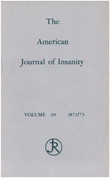Comparison of standards for assessing patients' capacities to make treatment decisions
Abstract
OBJECTIVE: This study investigated the proportion of psychiatric and medical patients who are impaired in their decision-making abilities in relation to each of several major legal standards for determining competence to consent to treatment. METHOD: The subjects were hospitalized patients with diagnoses of schizophrenia (N = 75), major depression (N = 92), and ischemic heart disease (N = 82) and equal numbers of community comparison subjects matched on age, race, gender, education, and occupation. Three instruments measuring abilities related to the legal standards for competence were administered to each group. Impaired functioning was defined as scores two standard deviations below the means for all subjects combined or lower. RESULTS: Although similar percentages of subjects with impaired performance were found for each of the measures, different groups of patients were identified as impaired depending on the measure used. The proportion of patients identified as impaired increased when compound standards were used, i.e., when impairment was defined as poor performance on any of two or three measures. Despite previous suggestions that the legal standards might form a hierarchy of rigorousness, the data did not support this hypothesis. CONCLUSIONS: Choice of standards for determining competence, including compound standards, will affect the identity and proportion of patients classified as impaired. Clinicians should be aware of applicable standards in their jurisdictions. Use of compound standards requires independent evaluation of performance on abilities related to each relevant standard, because standards do not appear to be hierarchical. Policies relating to the characterization of persons as incompetent must be fashioned with caution.
Access content
To read the fulltext, please use one of the options below to sign in or purchase access.- Personal login
- Institutional Login
- Sign in via OpenAthens
- Register for access
-
Please login/register if you wish to pair your device and check access availability.
Not a subscriber?
PsychiatryOnline subscription options offer access to the DSM-5 library, books, journals, CME, and patient resources. This all-in-one virtual library provides psychiatrists and mental health professionals with key resources for diagnosis, treatment, research, and professional development.
Need more help? PsychiatryOnline Customer Service may be reached by emailing [email protected] or by calling 800-368-5777 (in the U.S.) or 703-907-7322 (outside the U.S.).



